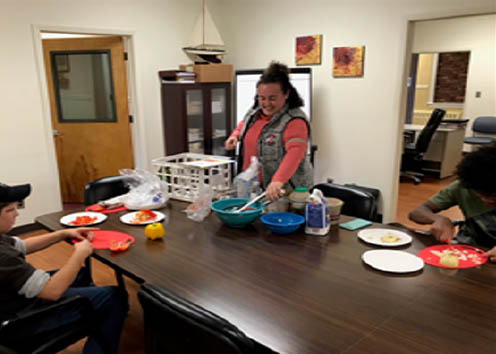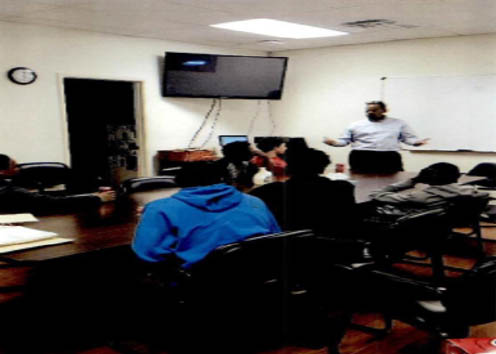Community Control Services
Michelle Breitigan – Director of Community Control / Chief Probation Officer

Michelle Breitigan was appointed to the position of Director of Community Control/Chief Probation Officer for the Allen County Common Pleas Court Juvenile Division Community Control Department in November 2021 by the Honorable Judge Todd Kohlrieser. Michelle began her career at the Court in 2002 as a Youth Leader in the Juvenile Detention Center. She was then hired as a Probation Officer in 2003. Michelle was promoted to Senior Probation Officer in 2009 and held that position until 2012 when she left the Court to work in the field of prevention. It was during that time Michelle began teaching classes in parenting, teen dating violence, suicide awareness and supervising local support groups ran by the agency. Michelle gained a great deal of knowledge and experience regarding mental health and child development during that time. She returned to the Court as a Probation Officer in 2015. She advanced to a Placement Coordinator/Probation Officer in 2016 and then Training Coordinator/Probation Officer in 2017.
In her position, as Director of Community Control/Chief Probation Officer, Michelle oversees all prevention, intervention, diversion and probation services offered by the Community Control department.
Michelle has professional certifications/specialized training in the following:
• Mental Health First Aid, Adult Course
• Diversity, Equity & Inclusion in the Workplace
• Moral Reconation Therapy, Facilitator Certification
• Youth Mental Health First Aid
• Motivational Interviewing, Beyond the Basics- September
• Carey Guides and Brief Intervention Tools
• Ohio Department of Job & Family Services, Ohio Child Welfare Training, 60 hours
• ACT Raising Safe Kids, Coordinator Certification
• Safe Dates, Facilitator Certification
• ACT Raising Safe Kids, Facilitator Certification
• Support Group Facilitation
• National Curriculum and Training Institute Group, Facilitator Certification
Michelle maintains professional affiliations with the following:
• Allen Lima Leadership Class of 2021
• Exchange Club of Lima
• Fraternal Order of Police
• League of Women Voters of the Lima Area
• Ohio Chief Probation Officer Association
• Ohio Juvenile Diversion Association
In 1999 Michelle completed her Associates Degree in Law Enforcement/Corrections Option. She became an Ohio Certified Prevention Specialist in May 2015. Michelle is currently enrolled in the Ohio Court Management Program through the National Center for State Courts and the Supreme Court of Ohio.
(419) 998-5249
528 W. Market St., Suite 200, Lima Ohio, 45801
Michelle Breitigan, Chief Probation Officer
Director of Community Control
mbreitigan@allencountyohio.com
COMMUNITY CONTROL
Using current research and evidence based programming the Allen County Juvenile Court has adopted a Community Control model that provides prevention, early intervention, diversion, presentence and official probation services.
Prevention/Intervention Services
In order to further prevention efforts, Intervention Specialists are engaged in community collaborations , such as the Bradfield Center, Conerstone of Hope Lima, Nine Consulting, SAFY Drop-In Center, and My Brother’s Keeper.

As an active member of the Youth Commission, Community Control recognizes the huge need for safe, pro-social activities for young people in our community. Referrals are made to local agencies that can assist youth & families in locating services needed to improve the youth’s social skills and enhance family relationships.
Community Control is also represented on the Lima Exchange Club. As an organization the Exchange club upholds three core values: Family, Community and Country with a special emphasis on reducing child abuse.
C.A.S.T. (Court Assessment Services Team)
Family intervention is offered at all levels of involvement with the Community Control Department. This is a multi-disciplinary team brought together to address the needs of youth and families in Allen County. The team works together to provide brief interventions and referrals to treatment or other community resources to ensure youth are successful in their homes, community and schools. The process of C.A.S.T. works to divert youth completely away from the juvenile justice system or from further involvement with the system. C.A.S.T. has been in place since 2002, first as a response to Domestic Violence and then expanding to become the community’s wraparound response for youth and families.
C.A.S.T. meetings can be requested by parents, school representatives or by Community health or child welfare agencies. The multi-disciplinary team is comprised of the Behavioral Health Navigator, (funded by the Mental Health and Recovery Services Board), the Community Advocate/Liaison from Allen County Children Services. A Juvenile Court representative and any other agency that may be of benefit to the youth/family. The Juvenile Court has seen success with the C.A.S.T. process and also recognizes the extensive behavioral health needs of some of the youth and families in the County.
School Success program
In response to HB410, legislation intended to encourage and support a preventative approach to excessive absences and truancy, the court developed a mechanism to work with adjudicated truants and their families . This program uses an individualized approach to address the underlying causes of the truant behavior and to identify educational alternatives that can lead to educational success. The Court has also received grant funding to operate a community based diversion truancy program to work with those youth experiencing truancy concerns at school. Nine consulting receives referrals directly from the Court of the school to work on improving attendance, offering case management and tutoring with the goal of reducing those youth officially charged with truancy.
Intervention Services
Diversion
The Community Control Department provides diversion for status offenders and misdemeanor offenses, which are referred from the Allen County Prosecutors office. The program also accepts first time felony complaints involving youth under the age of twelve. Participation in diversion is optional. However, the only other option is for the complaint to be filed and for the family to appear in Court on the matter.
All youth who participate in diversion are assessed to determine their risk/need level. The Ohio Youth Assessment System (OYAS) risk assessment is an instrument created by the University of Cincinnati to determine risk and needs in adolescent male and female offenders. There are three (3) levels of risk identified on the OYAS – Low, Moderate, and High. The MAYSI-2 (Massachusetts Youth Scoring Inventory – 2) is also administered; this is a mental health screening instrument.
Once the youth satisfies the interventions listed on the behavioral agreement, they have successfully completed diversion. There is no formal record of involvement with the Court.
The interventions in of the behavioral agreement can be highly individualized taking into consideration age, ability and the motivation behind the offense. In addition to a behavioral change intervention, emphasis is placed on engagement in pro-social activities. Research shows that the most effective diversion programs are those that least resemble official supervision.
Pre-Sentence Services
A Pre-Dispositional Report (PDR), which is equivalent to a Pre-Sentence Investigation (PSI) in the adult system, is ordered by the Judge or Magistrate to assist them in determining an appropriate disposition, based on the offense and the youth. A PDR is ordered at the discretion of the Judge or Magistrate. The Court’s Community Control Department is responsible for completing the PDR.
When completing a PDR, an officer gathers detailed information on the youth and the family and completes the risk/needs assessment. The goal is to paint a picture of the youth on paper, looking at several aspects of the youth’s life. There is an emphasis placed on family and the level of support provided. Other factors evaluated are previous involvement in the justice system, whether official or unofficial, peer involvement, education and employment, pro-social skills, substance use and mental health.
In addition, the Court periodically orders competency evaluations and / or psychiatric evaluations on youth with pending cases. When this occurs, the Community Control Department prepares the youth’s social history to provide to the evaluator. Similar to the Pre-Dispositional Report, an officer assigned to complete the report will meet with the youth and the family in order to gather information and administer risk and needs instruments.
Probation Supervision
Probation supervision is the most common disposition made in delinquency cases. The goal is to work within the doctrine of the least restrictive alternative.
During the intake for probation supervision the conditions of Community Control are reviewed, a MAYSI-2 (Massachusetts Youth Scoring Inventory-2) and the OYAS (Ohio Youth Assessment System) survey are also included. Corroborating information from involved school district and social service agencies is gathered. From this information an individualized case plan is developed and immediate referrals are made when necessary. The individualized case plan allows Court workers to provide linkage and networking services which may include therapy, electronic monitoring, mentoring services and small group counseling. In addition, the individualized case plan works to provide positive youth development activities and to foster success in school, as well as career preparation.
Community Control Officers monitor compliance with court orders, as well as assist the child and family in improving the child’s overall condition. Routine contacts are accomplished through office visits, home visits, and school visits.
Recent research has begun to take the role of probation supervision in a new direction. For the most part, formal probation supervision is now reserved for those youth who pose significant risk to public safety, allowing for much smaller more manageable caseload size. A concentrated effort is made to offer family focused interventions that approach rehabilitation from a strengths based perspective of growth and long-term success, rather than from a monitoring and surveillance perspective.
Assement Tools
MAYSI – Mental Health Screening (MAYSI-2) & Assessment is administered at intake for both diversionary and official supervision. Screening for mental health needs on early contact with youth in juvenile justice settings has become standard practice nationwide—at intake in probation, detention centers, or juvenile corrections programs. Identifying young people’s needs—substance use, trauma-related problems, and suicide ideation—is important at that initial contact. It‘s the first step for identifying those who need immediate attention and further assessment for mental health needs.
Behavioral Health Navigator – The Mental Health and Recovery Services Board funds the Behavioral Health Navigator. All counseling and outside assessments are coordinated through the Behavioral Health Navigator. The Behavioral Health Navigator provides consultation and recommendations to the programmatic departments of the Court when dealing with high risk behavioral health and multi-system involved youth. Further, the Liaison provides behavioral health service coordination, as well as behavioral health screening, assessment, treatment and linkage services.
OYAS – Ohio Youth Assessment System – The Ohio Youth Assessment System is an assessment package that is designed to assist juvenile justice professionals in providing the most effective interventions for youth based on their likelihood to reoffend, criminogenic needs, and barriers to services.
Services
 SANKOFA Violence Prevention Program – The purpose of this program is to reduce weapons-related offenses and to increase school and community engagements. This project utilizes SANKOFA, a youth violence prevention program that embraces traditional African values of consciousness, caring, connectedness, character, competency, commitment and courage to minimize the involvement in gun related violence and to promote resiliency.
SANKOFA Violence Prevention Program – The purpose of this program is to reduce weapons-related offenses and to increase school and community engagements. This project utilizes SANKOFA, a youth violence prevention program that embraces traditional African values of consciousness, caring, connectedness, character, competency, commitment and courage to minimize the involvement in gun related violence and to promote resiliency.
This program was chosen due to the propensity for gun violence among young African American males in our community, which has led to the disproportionate number of minorities committed to secure facilities. To enhance SANKOFA services, the Court uses funds provided by the Ohio Department of Youth Services to contract with Nine Consulting Services, who in addition to facilitating the SANKOFA groups provides comprehensive case management services for the participants in the community.
Curriculum Based Programming Fire-setters Program – This program is a collaborative effort between the Community Control Department and local fire departments. Referrals to the program are made by the Court, the County Prosecutor, parents, schools or local fire departments. Juvenile Fire-setters Programs utilize the same basic components; they include a juvenile and family interview, future fire risk determination, fire safety education and referral to mental health professionals when appropriate(2012).
The Behavioral Health Navigator meets with the youth and family and conducts a Juvenile Fire Setting Assessment. From that assessment, referrals can be made to mental health services. There is linkage to a local fire department which provides the youth with educational and awareness programming. Although the fire departments will take the lead role, their efforts alone will not resolve the problem. It is crucial that there be a working relationship established between the community agencies. The fire department, prosecutor’s office, Juvenile Court/Community Control, mental health professionals and schools must all communicate with one another so that an organized effort is established to reduce youth involvement in fire-setting and arson-related activities.
Carey Guides: Research demonstrates that traditional methods of supervision are ineffective in reducing recidivism among adult and juvenile offenders. For behavior change and recidivism reduction to be possible, offenders must understand the personal and environmental factors underlying their offending behavior and be taught the skills they need in order to make positive changes in the future. The Carey Guides are designed to equip corrections professionals with the information and tools they need to support these changes among their clients.
Each Guide follows a consistent format. Background information provides the corrections professional with important research findings and contextual information to support the application of evidence-based approaches. Each Guide also contains two to five Tools (worksheets). These Tools are designed for use by offenders—with the assistance of their corrections professional—to understand and address risk factors, triggers, and other conditions that are essential to their success. In total, the Guides contain 98 Tools that correction professionals can use as they work with offenders to address their skill deficits and make positive changes in their lives.
Carey Guides are used in both group settings and one-on-one appointments with the youth and the Court worker. They are used with youth placed on formal probation, as well as an intervention for youth on the Court’s diversion program.
Personal Responsibility Education Program (PREP): The Personal Responsibility Education Program (PREP) is a statewide initiative aimed to reduce teen pregnancy, HIV and sexually transmitted infections in the state of Ohio for youth 14-19 years of age residing in foster care and the juvenile justice systems.
Reducing the Risk (RTR), the evidenced-based curriculum, is the foundation for the pregnancy, HIV and sexually transmitted disease prevention education curriculum. Other topics include: Healthy Relationships, Financial Literacy Education and Career Success
AOD Awareness Program: The AOD Awareness educational class enlightens youth on the dangers of drugs and alcohol use. It also assists on identifying signs and symptoms of abuse.
AOD also uses an educational power-point tool and provides insight into the Phases of Addiction, impairment versus addiction, health concerns and withdrawal symptoms.
Moral Recognation Therapy (MRT): Moral Recognation Therapy (MRT) is a systematic treatment strategy that seeks to decrease recidivism among juvenile and adult criminal offenders by increasing moral reasoning. Its cognitive-behavioral approach combines elements from a variety of psychological traditions to progressively address ego, social, moral, and positive behavioral growth, to foster moral development in treatment-resistant clients.
Parent Intervention Program: Parent Intervention program is designed specifically for parents who are raising strong-willed, difficult, or out of control children. The program assists in reducing family conflict, juvenile crime and recidivism; along with improving both school performance and attendance. It is important to recognize that no family is the same. While some dynamics are familiar to us, how we function at home as a family can be drastically different from one family to another.
The program provides tools to families facing stressful situations as a way to address issues in a healthy way. The goal of the program is to strengthen the family, no matter the dynamic, and empower them to improve the quality of their lives together as a whole. While also educating them about the community supports offered in the area and allowing them to find comfort in the fact that they are not alone.


